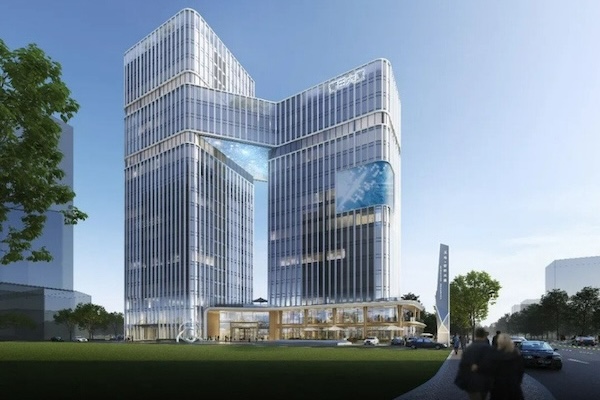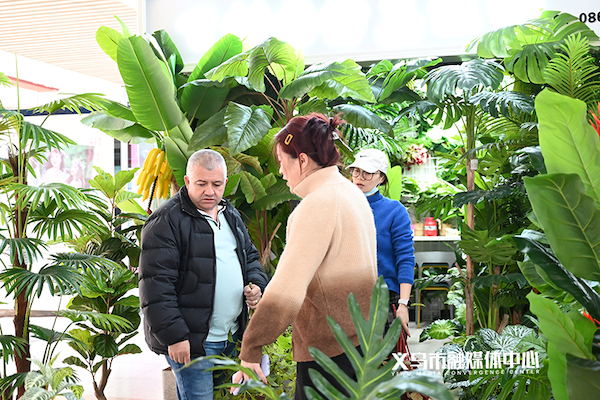Chinese companies score big at World Cup
Wanda Group is one of FIFA's seven corporate partners, along with Coca-Cola, Adidas, Hyundai-Kia, Qatar Airways, Qatar Energy and VISA. GlobalData said Wanda Group signed an $850 million 15-year deal with FIFA, which will expire at the 2030 World Cup.
Li Pengcheng, vice-president of Mengniu, said the Qatar World Cup will witness the release of suppressed demand due to the COVID-19 pandemic, adding that such an influential event will help unleash global consumption potential.
In addition to launching World Cup-themed ice cream in team colors for the tournament, Li said Mengniu will introduce more products to expand its presence in the Gulf nation in coming years.
Ni Xudong, senior vice-president and chief marketing officer at Vivo, said: "Soccer has the power to bring people together. We believe that innovation can help fans build a community and share exciting World Cup experiences with everyone across the globe, whether they are watching the games at a stadium or enjoying the experience from afar."
According to Vivo, with their presence at popular sports events around the world, Chinese brands are entering the international market in a more imperceptible way, and resonating emotionally with global users.
Li Jiang, executive director at Yutang Sports (Beijing) Co, a sports intelligence and marketing company, said: "World Cup sponsorship from a large number of Chinese companies not only demonstrates China's economic power, but also clearly shows the rapid transformation of the nation's manufacturing industry. The tournament offers these companies an advanced stage to showcase their products."
Song Xiangqing, vice-president of the Commerce Economy Association of China, which is headquartered in Beijing, said that even though it costs quite a lot to be a sponsor, connecting with the World Cup is the most direct way for Chinese companies to promote their brands and sell products in the global market.
Infrastructure projects
Lusail Stadium, which is scheduled to host 10 matches during the World Cup, was jointly built by Qatari construction companies and China Railway Construction Corp. It is the first time a Chinese company has built a World Cup venue, and the stadium also features on a Qatari banknote.
Meanwhile, the Al-Qasar 800-megawatt photovoltaic plant designed and built by Power Construction Corp of China, or PowerChina, went into operation in the middle of last month, helping Qatar's commitment to host a green World Cup.
Li Jun, PowerChina's onsite manager for this project, said, "Chinese equipment was used for all the photovoltaic parts, accounting for more than 60 percent of the total project investment — further enhancing the market share of Chinese companies in the Middle East."
Lin Jiang, a professor of economics at Sun Yat-sen University in Guangzhou, the Guangdong provincial capital, said the products, services and infrastructure projects Chinese companies have brought to the World Cup demonstrate the nation's industrial advantages in many areas, including the production of electric vehicles and photovoltaic equipment.
Growing influence
In addition to large companies, manufacturers in Yiwu, China's small commodities hub in Zhejiang, are also showcasing their growing influence during the World Cup.
From soccer balls and trophy ornaments to horns and whistles, the Yiwu Sporting Goods Association estimates that Yiwu accounts for some 70 percent of the tournament's peripheral goods market this year.
Wu Xiaoming, board chairman of Yiwu Aokai Sports Goods Co, an authorized soccer ball manufacturer for the 2022 World Cup, said the company, which has a production capacity of 800 such balls a day, had shipped 300,000 of them to Qatar and other parts of the world by the end of last month.
Many clients from the Middle East, Europe and Latin America are placing additional orders to meet soaring domestic demand, Wu added.
"Unlike orders placed in May, which were delivered by container ships, the new orders will be delivered by air freight services, as were the 2,000 soccer balls we shipped to Argentina last week," Wu said.
According to Yiwu Customs, driven by surging demand before the World Cup, companies in Yiwu exported 4.85 billion yuan ($677 million) worth of sporting goods in the first 10 months of this year, a year-on-year rise of nearly 39 percent.
Zhang Yongjun, a researcher at the China Center for International Economic Exchanges in Beijing, said that amid the slowdown in industrial chains due to the pandemic, geopolitical and geo-economic headwinds, China has accelerated its manufacturing industry upgrading and made positive contributions to global industrial chain and supply chain stability.

 Yiwu and Qingtian: Global supermarket alliance spurs economic growth
Yiwu and Qingtian: Global supermarket alliance spurs economic growth Artificial flowers: Yiwu's evergreen business
Artificial flowers: Yiwu's evergreen business Yiwu Intl Trade Market reopens after Spring Festival holiday
Yiwu Intl Trade Market reopens after Spring Festival holiday